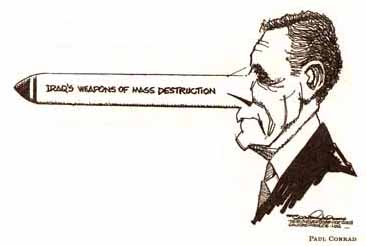Here's another Churchill posting that reinforces this point:
Ward Churchill's win is scholarship's loss
The ethnic studies professor should not have been fired for speaking out about 9/11. The problem remains his slanted work on Native American history.
By Gary Kamiya
By overreaching, Churchill did damage to his field--and that is the thing that is hard to forgive. Along with slavery, the destruction by whites of the Native American peoples and cultures is the greatest stain on the history and conscience of America. It is a tragedy and a crime that can never be undone, one that calls out for unflinching historical research. By making bogus claims about the crimes committed against American Indians, Churchill gravely harmed the cause he purports to support.
It seems clear that Churchill distorted the historical truth about the Dawes Act and the causes of the epidemics because the story of white genocidal intent was the story he believed in and wanted to tell. That is understandable: It is an absolutely plausible and defensible position that whites had genocidal intentions against native peoples. But it is not defensible to make up facts and distort the historical record so as to create specific examples of genocidal behavior for which there is no empirical evidence.
In a larger sense, the Churchill case reveals the problematic nature of advocacy scholarship. Passionate advocacy has a place in academia, but not if it leads to falsifications. The rise of advocacy scholarship was understandable and has generated much legitimate research and worthy polemics. But it also opened the door to hacks and ideologues. Ethnic studies and gender studies departments are always in danger of falling into breast-beating advocacy and identity-group solidarity. It is the responsibility of universities to make sure they don't.
In the conclusion of their report, the authors write, "If there is one crucial pattern that most affects our assessment ... it is a pattern of failure to understand the difference between scholarship and polemic, or at least of behaving as though that difference does not matter."
The ultimate lesson of the Churchill case is that no cause, however just, benefits from being taken up by a propagandist. Scholarship must be sacrosanct. Rules of evidence must be followed. You can't assert things that you want to believe are true, no matter how morally right or practically beneficial those assertions may be, and then distort or make up evidence to support them.
Ironically, and sadly, Churchill's approach to history and truth is remarkably similar to the Bush administration's. The only difference is that his propaganda is on the left, and theirs is on the right. For both, "reality" is what they say it is, and empirical evidence is just a bunch of meaningless window dressing. The Bush neocons "knew" that Saddam Hussein was involved in 9/11 and had weapons of mass destruction, just as Churchill "knew" that the U.S. Army intentionally spread smallpox among the Mandan Indians. The senior Bush aide who famously told Ron Suskind that "we create our own reality" could have spoken for Churchill.
In a polarized age, when it has become increasingly difficult for people to agree on the simplest facts, the academy remains the most powerful bulwark against the rising tide of relativism. As the reality-creating Bush administration proved, the disappearance of objectivity serves the interests of the powerful far more than it does the interests of the powerless. It's tempting for advocates to put their thumb on the scales, to make the oppressors look even worse and the victims more innocent. But when they do, they sacrifice their most precious possession, the one thing they have a duty to defend: the truth.
Below: Churchill-style propaganda.


3 comments:
Wardo doesn't so much advocate for natives he exploits them; his schtick so to speak is the angry injun. If he actually had any respect for Indians do you think he'd lie about Native history? Do you think he'd claim to be one? Do you think he'd dress like a caricature of one?
Ward is at least as bad as the fake Indians depicted in the tax-protest post. At least they aren't so delusional as to think that their play dress-up means they are a real Indian.
For more on the points you raised, see Churchill's Role in Native Studies and Churchill Lies on Camera.
Post a Comment